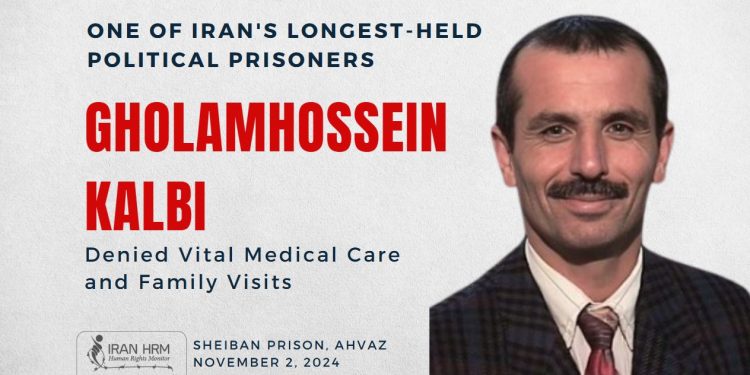Iran HRM has received credible reports concerning Gholamhossein Kalbi, one of Iran’s longest-held political prisoners, who is reportedly facing severe conditions in Sheiban Prison, Ahvaz. At 65, Kalbi has been detained for over three decades without any furlough, a rarity even among long-term political prisoners in Iran. Since his most recent imprisonment in 2000, Kalbi is said to have endured continuous mistreatment, raising serious concerns about his health and the broader treatment of political prisoners within Iran’s penal system.
According to sources, Kalbi is currently confined in overcrowded conditions in Ward 5 of Sheiban Prison, where he is denied even minimal space for exercise or movement. The room he occupies houses twice its intended capacity, further exacerbating his deteriorating health. Kalbi suffers from dental decay, ear infections, high blood cholesterol, and a persistent skin fungus, for which he has reportedly received insufficient treatment.
Kalbi, originally from Bandar Mahshahr, has repeatedly requested transfer to a prison nearer to his family, such as in Mahshahr or Tehran. However, Iran’s Ministry of Intelligence has allegedly denied this request, citing his continued adherence to his political beliefs and refusal to express remorse.
Kalbi’s History of Imprisonment
Born in 1959, Kalbi was first detained in the early 1980s for alleged support of the opposition group, the People’s Mojahedin Organization of Iran (PMOI/MEK). He spent six years in southern Iranian prisons before being rearrested in 2001 in Dezful. Following his arrest, he was transferred to a detention center operated by the Islamic Revolutionary Guard Corps (IRGC) in Ahvaz, where he was held in solitary confinement for 14 months under reportedly harsh interrogation methods. His case was later moved to Evin Prison in Tehran.
In 2002, Kalbi was tried on charges of “enmity against God” due to his alleged association with the MEK and was initially sentenced to death by the Revolutionary Court in Tehran. He denied all charges, claiming his confession was coerced under duress. Though his death sentence was upheld on appeal, it was eventually commuted to life imprisonment. Kalbi was reportedly denied the right to choose his own legal representation, and a court-appointed lawyer was assigned to his case.
In 2007, at his request, Kalbi was transferred from Evin Prison to a facility in Mahshahr, close to his family. However, he was subsequently moved to Karun Prison in Ahvaz, and then in 2015, following Karun’s closure, to Sheiban Prison, where he remains today.
In addition to enduring harsh conditions, Kalbi has been repeatedly denied furlough. In 2015, he was barred from attending the funeral of his sister, and in 2016, he was prevented from participating in his brother’s funeral after his brother suffered a fatal heart attack en route to the prison for a long-awaited visit.
Kalbi has also been subject to disciplinary measures, including solitary confinement and punitive transfers. In May 2020, following a prison protest in Sheiban the previous month, he was placed in isolation and later moved to a ward designated for drug-related offenders, where he has limited access to recreational and general prison facilities.
Reports indicate that authorities periodically pressure Kalbi to renounce his beliefs publicly, including requests for a televised statement of remorse, which he has refused.
Kalbi’s prolonged detention without furlough, restricted access to medical care, and isolation from his family exemplify serious and ongoing human rights concerns in Iran’s prison system. His case highlights systemic issues facing political prisoners, including denial of legal representation, pressure to make public confessions, and severe restrictions on basic rights to family contact and health care.
* Sheiban Prison joined the 23 prisons across Iran in the “No to Execution Tuesdays” on October 24, 2024

